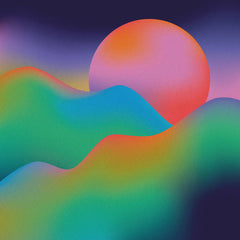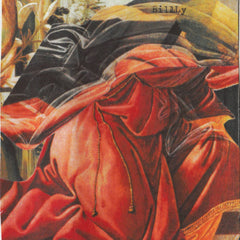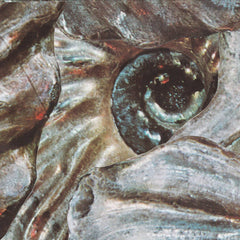Hiroshi Yoshimura // Music for Nine Post Cards LP
- Availability:
日本のアンビエント作家Hiroshi Yoshimuraの再発盤です。
-------------------------------------------
12" black vinyl.
Tracklist:
A1 Water Copy
A2 Clouds
A3 Blink
A4 Dance PM
B1 Ice Copy
B2 Soto Wa Ame
B3 View From My Window
B4 Urban Snow
B5 Dream
Pitchfork review excerpt, written by Thea Ballard [link]:
"...Ambient music is often linked to a kind of psychic interiority, but Yoshimura—who overlapped with the post-Fluxus contemporary art scene of 1960s and 1970s Tokyo—made music responding to and designed to exist in physical places: for train stations, runway shows, and so on. In 1982, a version of Music for Nine Postcards was the first release in Satoshi Ashikawa’s Wave Notation series; Ashikawa and Yoshimura defined and advocated for what they termed “environmental music,” “music which by overlapping and shifting changes the character and the meaning of space, things, and people,” wrote Ashikawa. “Music,” he argues, “is not only meant to be something which exists alone.” Influenced by figures like Erik Satie and Brian Eno, this developing sound also progressed with a specificity and gentle sense of intent, responding to urban sonic overload (and, perhaps, to developing ideas about media: an awareness that culture doesn’t just reflect reality, but actively produces it).
Music for Nine Postcards, then, is an intervention conducted through near-stillness. Composed with a minimal setup including a Fender Rhodes piano, the songs collected here are built around simple melodies that Yoshimura modulates in small, affecting ways. In a 1999 text reprinted in this reissue’s liner notes, he likens his process to planting a “seed” as a means of seeking “a prime number.” There’s little texture in them beyond the keyboard’s warm finish: a phrase will move alongside a complementary droning tone, and perhaps a harmony will wander in, but Yoshimura’s pieces rarely build. Despite this lack of sonic density, however, they have a disarming presence, cutting sweetly into the listener’s reality.
The effect is multidimensional: melancholy, wistful, invigorating, consoling. In a sense, though these sounds are conversational in their way, Yoshimura leaves quite a bit of room for the listener’s mood and memories. The record’s effects are, like the nature iconography he invokes, delivered with broad, almost neutral strokes. But space—even, or especially, the crowded and overwhelming urban kind—is necessarily emotional. It is loaded with memory, or whatever abstract something floats in the air when humans have been feeling their way through a place—and he taps into this characteristic of our every-day beautifully. Yoshimura’s practice shines light onto corners of feeling that might otherwise go unnoticed."
Artist : Hiroshi Yoshimura
Label : Empire of Signs
日本のアンビエント作家Hiroshi Yoshimuraの再発盤です。
-------------------------------------------
12" black vinyl.
Tracklist:
A1 Water Copy
A2 Clouds
A3 Blink
A4 Dance PM
B1 Ice Copy
B2 Soto Wa Ame
B3 View From My Window
B4 Urban Snow
B5 Dream
Pitchfork review excerpt, written by Thea Ballard [link]:
"...Ambient music is often linked to a kind of psychic interiority, but Yoshimura—who overlapped with the post-Fluxus contemporary art scene of 1960s and 1970s Tokyo—made music responding to and designed to exist in physical places: for train stations, runway shows, and so on. In 1982, a version of Music for Nine Postcards was the first release in Satoshi Ashikawa’s Wave Notation series; Ashikawa and Yoshimura defined and advocated for what they termed “environmental music,” “music which by overlapping and shifting changes the character and the meaning of space, things, and people,” wrote Ashikawa. “Music,” he argues, “is not only meant to be something which exists alone.” Influenced by figures like Erik Satie and Brian Eno, this developing sound also progressed with a specificity and gentle sense of intent, responding to urban sonic overload (and, perhaps, to developing ideas about media: an awareness that culture doesn’t just reflect reality, but actively produces it).
Music for Nine Postcards, then, is an intervention conducted through near-stillness. Composed with a minimal setup including a Fender Rhodes piano, the songs collected here are built around simple melodies that Yoshimura modulates in small, affecting ways. In a 1999 text reprinted in this reissue’s liner notes, he likens his process to planting a “seed” as a means of seeking “a prime number.” There’s little texture in them beyond the keyboard’s warm finish: a phrase will move alongside a complementary droning tone, and perhaps a harmony will wander in, but Yoshimura’s pieces rarely build. Despite this lack of sonic density, however, they have a disarming presence, cutting sweetly into the listener’s reality.
The effect is multidimensional: melancholy, wistful, invigorating, consoling. In a sense, though these sounds are conversational in their way, Yoshimura leaves quite a bit of room for the listener’s mood and memories. The record’s effects are, like the nature iconography he invokes, delivered with broad, almost neutral strokes. But space—even, or especially, the crowded and overwhelming urban kind—is necessarily emotional. It is loaded with memory, or whatever abstract something floats in the air when humans have been feeling their way through a place—and he taps into this characteristic of our every-day beautifully. Yoshimura’s practice shines light onto corners of feeling that might otherwise go unnoticed."
Artist : Hiroshi Yoshimura
Label : Empire of Signs





![Dominic Voz // Right To The City LP [COLOR]](http://tobirarecords.com/cdn/shop/files/ci1_67398775-5502-487d-ad16-a1bb75fad721_medium.jpg?v=1700714342)


